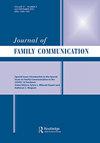Attributions and Framing in Working Mothers’ Reports About Division of Family Labor
IF 1.8
Q2 COMMUNICATION
引用次数: 0
Abstract
ABSTRACT This study investigated the process of attribution making regarding family labor in the context of dual earning families with children. Data consisted of 257 attribution statements from 34 working self-identified mothers of children under 18 that were made about experiences with family labor. Findings indicated that participants attribute their experiences to a variety of external, relational, and internal factors including paid work flexibility, gender, amount of labor, responsiveness, task ownership, qualities, roles, and preferences. Further analysis of the internal locus revealed 18 ways participants frame their own and their partners’ qualities and roles. Findings suggest that intrapersonal role conflict, paid work flexibility, health and wellness, and negative partner framing may offer important new insight related to relational equity within the context of family labor.职场母亲家庭分工报告中的归因与框架
摘要本研究调查了在有子女的双收入家庭中,家庭劳动的归因过程。数据包括来自34位有18岁以下儿童的工作自我认同母亲的257份归因陈述,这些陈述是关于家庭劳动经历的。研究结果表明,参与者将自己的经历归因于各种外部、关系和内部因素,包括带薪工作灵活性、性别、劳动量、反应能力、任务所有权、素质、角色和偏好。对内部轨迹的进一步分析揭示了参与者构建自己和伴侣素质和角色的18种方式。研究结果表明,在家庭劳动的背景下,个人角色冲突、带薪工作灵活性、健康和身心健康以及消极的伴侣框架可能会提供与关系公平相关的重要新见解。
本文章由计算机程序翻译,如有差异,请以英文原文为准。
求助全文
约1分钟内获得全文
求助全文

 求助内容:
求助内容: 应助结果提醒方式:
应助结果提醒方式:


